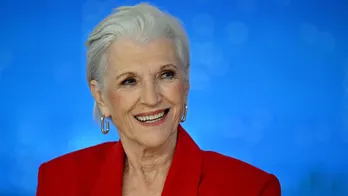Through new pilot project, medical marijuana could become more accessible to senior citizens
A new initiative dubbed The Commonwealth Project, based in Massachusetts, aims to integrate medical cannabis into traditional health care for seniors.
"People 65 and over are the fastest-growing segment using cannabis, but they're using it for ailments of aging, [for] relief," Howard Kessler, the group’s founder, told Fox News.
Medical marijuana is legal in 37 states, four U.S. territories and Washington, D.C.
SEVERAL GROUPS SAY CANNABIS MAY HELP AGING AMERICANS MANAGE PAIN
It is not legal at the federal level, however, which means doctors cannot prescribe cannabis.
"I've talked to many physicians who say they get asked five times a day by their patients, 'I'd like to try [it].' And the physician says, 'I think you should. But I'm of no help,'" William Van-Faasen, former CEO of Blue Cross Blue Shield of Massachusetts, told Fox News.
Most states do require documentation for medical marijuana.

Medical marijuana is not legal at the federal level, meaning doctors cannot prescribe cannabis. (iStock)
The Compassionate Use Act allows health care providers to write recommendations for the substance instead of traditional prescriptions.
"Doctors need to know the benefits that cannabis has on seniors’ lives," Keith Myers, CEO of MorseLife Health System, a senior living community based in Palm Beach, Florida, told Fox News.
DAILY MARIJUANA SMOKERS FACE HIGHER RISK OF HEART ATTACK, STROKE, SAYS AMERICAN HEART ASSOCIATION STUDY
"They need to understand that it should be part of the drug regimen that they make recommendations for."
"It's the wild west. Consumers are left on their own."
Even with informed doctors, senior citizens can face hurdles when trying to access cannabis treatment.
"It's the wild west. Consumers are left on their own," former Massachusetts HHS Secretary Marylou Sudders told Fox News.
Dispensaries often do not have on-site doctors or pharmacists, and the quality of cannabis can vary from place to place.
THESE ARE THE TOP HEALTH RISKS OF MARIJUANA USE, ESPECIALLY SMOKING CANNABIS
"Think about what it's like when they want to try it," Kessler said. "When you go into the dispensary, they aren't doctors or health people. They aren't experts … So you're not getting the guidance. There's no follow-up."
Some groups say that increased regulation is needed before access to medical marijuana is expanded.

It is important to be aware of the different formulations, dosages and delivery systems, experts cautioned. (iStock)
"There are … literally hundreds of thousands of different formulations you could be thinking about," Kevin Sabet, president and CEO of the nonprofit Smart Approaches to Marijuana in New York City, told Fox News.
"You really have to be careful about the dosage, the delivery system."
Kessler’s pilot project in Massachusetts would allow for medical cannabis through a payer-provider system like Medicare Advantage.
DOCTOR WARNS OF CANNABIS-RELATED MEDICAL RISKS: LEGAL DOES NOT MEAN SAFE
"They have your health records. They keep tremendous data," he said. "They keep actuarial data … You could use the data to improve the efficacy. You could create a safer product. You could train the caregiver."
Kessler’s group has already conducted smaller studies, which he said have shown promise for cannabis use among seniors.
"You don't feel so dopey like you do with Xanax," said one patient.

Dispensaries often do not have doctors or pharmacists onsite, and the quality of cannabis can vary from place to place, experts say. (REUTERS/Eduardo Munoz/File Photo)
In one study conducted at a senior living facility in Florida, more than 80% of participants reported a positive impact.
"[Even if] something can be prescribed and it is approved [for] medical use, we still have to work to convince prescribers to offer the product as an alternative," Robert Kent, former White House general counsel of National Drug Control Policy in Washington, D.C., told Fox News.
MORE AMERICANS SMOKE MARIJUANA DAILY THAN DRINK ALCOHOL, STUDY CLAIMS
"I think that using the payers, the insurance companies, to help with that is an enormously smart idea."
"If you really want equitable access, insurance coverage at some point is the way to go."
Seventy-four percent of participants also said that marijuana was more cost-effective than prescription drugs — while 56% stopped taking other pharmaceuticals altogether.
"Doing it within that health care system, you can scale it up in a massive way — and very quickly," said Kent. "It could exponentially save a bunch of money, which could be used to secure the program and … for other purposes."

Thirty percent of people over age 65 take five or more pharmaceuticals daily, according to the National Institutes of Health. (iStock)
Thirty percent of people over the age of 65 take five or more pharmaceuticals daily, according to the National Institutes of Health.
One study for Health Affairs found that doctors prescribed an average of around 1,800 fewer doses of painkillers each year to Medicare members in states where marijuana was legal.
CLICK HERE TO SIGN UP FOR OUR HEALTH NEWSLETTER
If marijuana is legalized nationwide, Health Affairs projects savings of up to $500 million per year.

Even for those with informed doctors, senior citizens can face hurdles when trying to access cannabis treatment. (iStock)
"For some people, the cost is a deterrent," Sudders said. "And so, if you really want equitable access, then insurance coverage at some point is the way to go."
Medicare Advantage programs can reimburse for products and services that are outside traditional medical care, he noted.
"You're working within the system, not asking for a new system to be created."
CLICK HERE TO GET THE FOX NEWS APP
But some groups aren’t convinced — and say more research is needed.
"I think it's been oversold," Sabet said.
"I think in a lot of other studies, [it] shows that people have those same outcomes when they're taking a placebo … and they think they're taking this. And so I think we really need to look at this very closely."
For more Health articles, visit www.foxnews.com/healt.
Kessler said he hopes his team will study it more closely and find benefits that could change the health care landscape.
Those involved believe the pilot could launch within the next year.
"If CMS, the Medicaid and Medicare folks, approve this proposal, I think within six months to a year, we'll start to have solid information," Kent predicted.
"Then it could be expanded across all age groups for the same conditions."
Disclaimer: The copyright of this article belongs to the original author. Reposting this article is solely for the purpose of information dissemination and does not constitute any investment advice. If there is any infringement, please contact us immediately. We will make corrections or deletions as necessary. Thank you.







